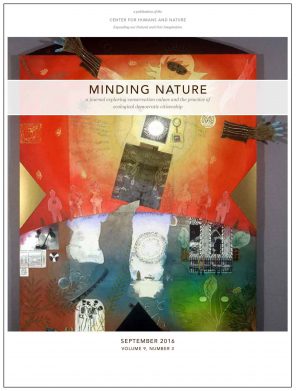Minding Nature — “From Exhibit to Classroom: Transitioning Aquariums and Zoos for the Twenty-First Century”
Jeanne Gang proposes a new model for aquariums and zoos that transitions them from entertainment to education.
“People young and old are captivated by Calypso, the Green Sea Turtle who lives at the National Aquarium. Whether swimming in the crystal-blue waters of the Blacktip Reef exhibit, nibbling on romaine lettuce and the occasional squid, or peeking her head out just above the glistening surface, the five-hundred-pound, three-flippered Calypso is a sight to behold. The giant turtle was rescued by the Riverhead Foundation for Marine Research and Preservation in 2000, after becoming cold-stunned and stranded in the Long Island Sound. At the time of her rescue, Calypso weighed only six pounds and had a badly infected front flipper that was later amputated. Due to federal regulations governing the rescue, rehabilitation, and release of endangered marine life, the Riverhead Foundation could not return Calypso to her habitat. Instead, she came to live at the National Aquarium, where she has been delighting visitors ever since as one of the Aquarium’s most popular attractions.
By providing Calypso with a clean habitat, ample food, and medical care, the National Aquarium has likely spared her from the fate of many sea turtles in the wild who face mounting challenges including poaching, bycatch, disease, and habitat loss. In partnering with organizations like the Riverhead Foundation and the North Carolina Aquarium, the National Aquarium is also helping to rescue, rehabilitate, and release a variety of species of sea turtles who can be returned to their habitats. And through various media and educational programs, the Aquarium is working to communicate the crucial message that it is we humans and our harmful activities that pose the greatest threat to these animals.
But while the experience of seeing Calypso in the Blacktip Reef exhibit at the National Aquarium is designed to motivate visitors to take personal and political action toward conservation, studies show that it doesn’t. According to the report “Do Zoos and Aquariums Promote Attitude Change in Visitors? A Critical Evaluation of the American Zoo and Aquarium Study,” by Lisa Marino, et al., “there remains no compelling evidence for the claim that zoos and aquariums promote attitude change, education, or interest in conservation in visitors.” How can these well-meaning organizations who do so much for animal rehabilitation, like saving Calypso, make progress on conservation action? Is it possible these institutions have a business model that is preventing them from succeeding in their missions—and, if it is, how can they bring about change and stay financially viable? …”

